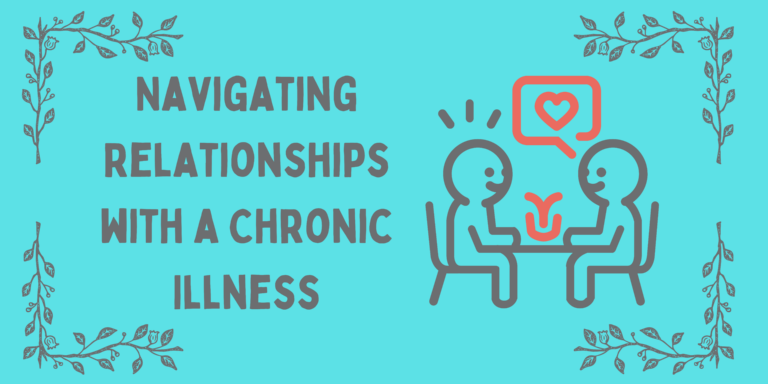I was diagnosed with mixed connective tissue disease as a teenager, and like most young people facing a chronic illness, I worried about how it would shape my life. School, friendships, career – everything felt uncertain to me. And as I entered high school and later college one of my biggest uncertainties was dating.
How would I ever feel comfortable enough to share every part of myself with someone else? Not just the surface-level details, but the difficult, unspoken realities of living with a chronic illness. The fatigue, the pain, the insurance battles, the unpredictability of it all. Would someone want to take on that burden?
When I met my now-husband during my last year of college, my arthritis was in remission. I was living 1,000 miles away from home at college, studying, partying, and not worried about my arthritis. I shared with him about my chronic illness pretty early on but I downplayed it, saying, “It doesn’t affect me much”.
I wish that had stayed true.
After I graduated college, my flare-free days ended pretty abruptly. Six months after we moved in together, I was scrambling to find a new rheumatologist, getting frequent labs, starting a new biologic injection, and dealing with endless insurance headaches. It went from “it doesn’t affect me much” to my health defining our day-to-day lives in what felt like an instant.
That shift wasn’t easy, but it taught me a lot about relationships, communication, and how to navigate dating when your health is unpredictable.
When and How to Open Up
One of the hardest parts of dating with a chronic illness is deciding when to tell someone. Do you mention it right away or wait until it becomes relevant? What if they react badly?
When I told my now-husband early on in our relationship, it felt easy because my illness wasn’t actively affecting me at the time. I told him about the camp I went to growing up for kids with arthritis. I told him how it was really hard when I was younger, but I was doing better now. I kept things vague because, at that moment, it didn’t seem like a big deal. But I know if I had been flaring how different that conversation would have been.
There’s no perfect script for these conversations, unfortunately, but here are a few things that have helped me talk about my chronic illness along the way:
- Start small: You don’t have to lay everything out at once. A simple, “I have a chronic illness, but I manage it well,” can open the door to a bigger conversation. It can also help you gauge how to manage future conversations.
- Let the conversation unfold naturally: For me, this has always been the key. As someone who actively volunteers with the Arthritis Foundation and was involved as a kid in the arthritis summer camps, slipping it into a conversation is easier than bringing it up cold. You can also bring it up in response to a situation, maybe you need to reschedule plans or stop to take medications, this can be a good time to share a little bit more of your story.
- Be honest, but don’t feel pressured: At the end of the day, your story is yours to share and you control how much information you share and when.
The right person won’t run at the first mention of your chronic illness. And if they do? That tells you everything you need to know.
Navigating Changes in Health While Dating
Telling my partner about my illness was one thing, but navigating the shift from remission to active disease was another challenge entirely.
When I graduated and we moved in together, I went from feeling healthy and independent to suddenly needing frequent doctor visits, bloodwork, and new treatments. Overnight, our relationship had to adjust to the reality of my illness in ways it never had before.
While I was hesitant to let him into my bubble to see how I was truly feeling, it paid off immensely. He became my biggest supporter, advocate, and confidant. He jumped in to take care of me when I needed it most, helped give me my weekly injections, and kept track of my prescriptions.
If you’re in a relationship and your health suddenly changes, it’s tough to navigate. Here are a few things that have helped me:
- Be open about what’s happening: Your partner can’t support you if they don’t know what’s going on. As scary as it can be to let people in, the people who love you the most just want to find ways to help.
- Let them process: It’s okay if they have questions or need time to adjust. Giving them time to learn and pivot will help them navigate the best ways to support you.
- Accept help without guilt: It’s not a burden to be supported; it’s a part of every relationship. A relationship with a chronic illness will look different but no relationship is perfect.
Managing Guilt
Even though my husband has never made me feel like my illness is “too much”, I have still struggled with feelings of guilt. Guilt for needing extra help, for my chronic illness taking priority, and for sometimes feeling like I’m not 100% the partner I want to be. But relationships aren’t about perfection. They’re about support, understanding, and adapting together.
- Recognize that needing help is okay: It’s not a sign of weakness, but a part of being human. Allowing your partner to support you can deepen your connection.
- Be kind to yourself: Chronic illness is tough on both you and your partner. Don’t expect yourself to always be at your best; relationships are about being there for each other through both good and bad times.
- Communicate your feelings: If you’re feeling guilty, talk about it. Let your partner know how you’re feeling and why.
Looking back, I realize that my illness didn’t weaken our relationship–it made it stronger. We learned how to communicate and support each other and how to navigate life’s unpredictability as a team.
So if you’re dating with a chronic illness, know this: The right person will see all of you—the good days, the bad days, and everything in between. They will love you not despite it, but because of who you are.

